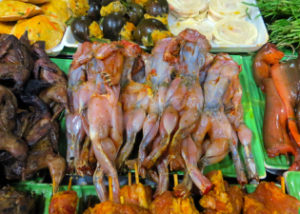
August is the time of year popular for grilling, family outdoor cookouts, and trips to the local farmers’ market. As you enjoy family barbecues, block parties, and campfires, we have put together four simple steps to follow to protect yourself, family, and friends from food poisoning:
#1: Separate Raw Meat from Produce at the Grocery Store
While in the supermarket, make sure you separate fresh fruit and vegetables from raw meat, poultry, seafood, and eggs in your shopping cart and checkout bags. The fresh fruits and vegetables should also be kept in their own compartment within the refrigerator. When preparing food for cooking, never use the same cutting board or utensils without first cleaning it with hot water and soap.
#2: Check Produce for Cuts and Bruising
Bacteria can thrive in fruits and vegetables that are damaged or bruised. It is possible for damaged fruit to grow some of the more notorious varieties of food borne pathogens, such as salmonella or E. coli. If in doubt, simply throw the bad fruit out. This is especially important if small children or the elderly will be consuming any fruits or vegetables. Never allow any fruits or vegetables to touch any raw meat, poultry, seafood, or eggs.
#3: Rinse, Rinse, Rinse
Just before consuming any fruits or veggies, rinse them under running water. You can then dry them with a clean cloth or paper towel. Do not use soap or bleach to wash any fresh fruits or vegetables. Even if you do not plan to eat the skin, it is still important to wash the produce first so bacteria is not transferred from the surface.
#4: Refrigerate Fruits or Vegetables Shortly After Preparation
Always keep your refrigerator at or below 40 degrees or below. Refrigerate all cut, peeled or cooked fresh fruits and vegetables no more than two hours after preparing them. Store garlic, onions, and potatoes in a well-ventilated area in the pantry.






